
# Precision Swiss Machining for Complex Components
## The Art of Swiss Machining
Swiss machining, also known as Swiss screw machining or Swiss turning, represents the pinnacle of precision manufacturing for complex, small-diameter components. This advanced machining technique originated in Switzerland’s watchmaking industry and has evolved into a critical process for industries requiring micron-level accuracy.
Keyword: Swiss Machining
## Why Choose Swiss Machining?
The Swiss machining process offers several distinct advantages:
– Exceptional precision for tight tolerance requirements
– Ability to machine complex geometries in a single setup
– Superior surface finishes
– Reduced material waste
– High repeatability for large production runs
## Key Applications of Swiss Machining
### Medical Industry
Swiss machines produce surgical instruments, implants, and diagnostic equipment components with the required precision and biocompatibility.
### Aerospace Components
Critical aircraft parts like fuel system components, fasteners, and sensor housings benefit from Swiss machining’s accuracy and reliability.
### Electronics Manufacturing
Connectors, pins, and other miniature electronic components are ideally suited for Swiss machining processes.
## The Swiss Machine Advantage
Unlike conventional lathes, Swiss machines feature a sliding headstock and guide bushing that provides unparalleled support for the workpiece. This unique configuration allows for:
– Machining of long, slender parts without deflection
– Simultaneous multiple operations
– Exceptional dimensional stability
– Reduced vibration during cutting operations
## Material Capabilities
Modern Swiss machining centers can handle a wide range of materials including:
Material Type | Common Applications
Stainless Steel | Medical implants, aerospace fasteners
Titanium | Orthopedic devices, aircraft components
Brass | Electrical connectors, plumbing fittings
Plastics | Medical device components, insulators
## Choosing the Right Swiss Machining Partner
When selecting a Swiss machining provider, consider these critical factors:
– Experience with your specific industry requirements
– Quality certifications (ISO, AS9100, etc.)
– Advanced inspection capabilities
– Material expertise
– Capacity for both prototyping and production runs
The combination of Swiss precision engineering and modern CNC technology creates manufacturing solutions that are simply unmatched for complex, high-precision components. As industries continue to demand smaller, more intricate parts with tighter tolerances, Swiss machining remains at the forefront of precision manufacturing.
Comments are closed